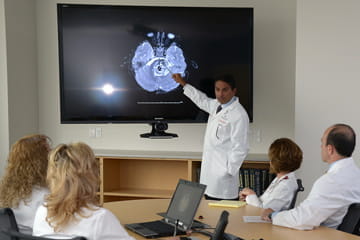A person with Alzheimer’s disease typically has trouble with cognition – thinking, reasoning, judgment and decision-making skills – that may interfere with important functions like paying bills and driving. Over time, these individuals begin to have trouble with activities of daily living such as personal hygiene, using the restroom and bathing independently, and begin having behavioral disturbances as their cognitive skills further decline:
Subjective cognitive complaints or mild cognitive impairment can precede any measurable changes. Depression may also occur.
The individual experiences memory loss, diminished judgement, poor decision-making skills, language issues, mood swings and/or personality changes.
Behavioral challenges such as agitation, aggression and/or delusions occur. The individual may also be unable to learn or recall new information, wander or get lost in familiar places, and/or require more assistance with activities of daily living. Long-term memory may also be affected at this stage.
An individual at the severe stage of Alzheimer’s disease may experience difficulty walking and/or other motor disturbances, are unable to perform activities of daily living, and/or are bedridden. Placement in a long-term care facility is necessary for almost all Alzheimer’s patients in this stage.

What is Alzheimer's disease?
Alzheimer’s diseases is the most common form of dementia.

How is Alzheimer's treated?
There is currently no prevention, cure or approved disease-modifying intervention for Alzheimer’s disease.